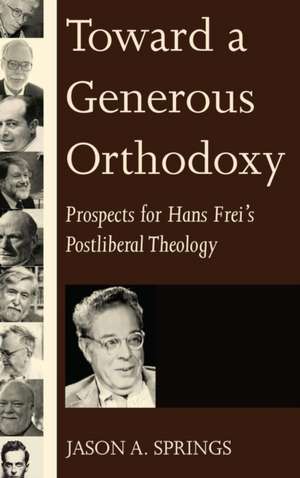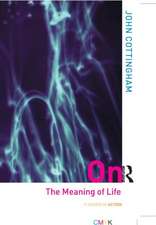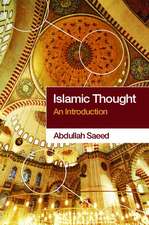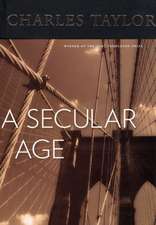Toward a Generous Orthodoxy
Autor Jason A. Springsen Limba Engleză Hardback
| Toate formatele și edițiile | Preț | Express |
|---|---|---|
| Paperback (1) | 178.40 lei 3-5 săpt. | |
| – | 178.40 lei 3-5 săpt. | |
| Hardback (2) | 292.55 lei 3-5 săpt. | |
| – | 292.55 lei 3-5 săpt. | |
| Oxford University Press – 20 oct 2010 | 537.11 lei 41-52 zile |
Preț: 292.55 lei
Nou
Puncte Express: 439
Preț estimativ în valută:
55.98€ • 58.60$ • 46.32£
55.98€ • 58.60$ • 46.32£
Carte disponibilă
Livrare economică 15-29 martie
Preluare comenzi: 021 569.72.76
Specificații
ISBN-13: 9781532605437
ISBN-10: 1532605439
Pagini: 248
Dimensiuni: 152 x 229 x 16 mm
Greutate: 0.5 kg
ISBN-10: 1532605439
Pagini: 248
Dimensiuni: 152 x 229 x 16 mm
Greutate: 0.5 kg
Notă biografică
Jason Springs studied theology, ethics, and philosophy at Princeton Seminary and Harvard University. He held a post-doctoral fellowship in Christian Thought and Practice at Princeton University's Center for the Study of Religion and is now Associate Professor of Religion, Ethics, and Peace Studies at the University of Notre Dame.
Descriere
Descriere de la o altă ediție sau format:
Hans Frei, one of the most influential American theologians of the twentieth century, is generally considered a founder of postliberal theology. Frei never set forth his thinking systematically, and he has been criticized for being inconsistent, contradictory, and insufficiently rigorous. Jason Springs seeks here to offer a reevaluation of Frei's work. Arguing that Hans Frei's theology cannot be understood without a meticulous consideration of the complex equilibrium of his theological and philosophical interests and influences, Springs vindicates Frei's Christologically motivated engagement with Ludwig Wittgenstein, Clifford Geertz, and Erich Auerbach, as well as his use of ordinary language philosophy and non-foundational philosophical insights, while illuminating hisorientational indebtedness to Karl Barth's theology. Moreover, by placing Frei's work in critical conversation with developments in pragmatist thought and cultural theory since his death, this re-reading aims to resolve many of the misunderstandings that vex his theological legacy.What emerges from Toward a Generous Orthodoxy is a sharpened account of the Christologically anchored, interdisciplinary, and conversational character of Frei's theology, one he came to describe as a "generous orthodoxy"-modeling a way for academic theological voices to take seriously both their vocation to the Christian church and their roles as interlocutors in academic discourse.
Hans Frei, one of the most influential American theologians of the twentieth century, is generally considered a founder of postliberal theology. Frei never set forth his thinking systematically, and he has been criticized for being inconsistent, contradictory, and insufficiently rigorous. Jason Springs seeks here to offer a reevaluation of Frei's work. Arguing that Hans Frei's theology cannot be understood without a meticulous consideration of the complex equilibrium of his theological and philosophical interests and influences, Springs vindicates Frei's Christologically motivated engagement with Ludwig Wittgenstein, Clifford Geertz, and Erich Auerbach, as well as his use of ordinary language philosophy and non-foundational philosophical insights, while illuminating hisorientational indebtedness to Karl Barth's theology. Moreover, by placing Frei's work in critical conversation with developments in pragmatist thought and cultural theory since his death, this re-reading aims to resolve many of the misunderstandings that vex his theological legacy.What emerges from Toward a Generous Orthodoxy is a sharpened account of the Christologically anchored, interdisciplinary, and conversational character of Frei's theology, one he came to describe as a "generous orthodoxy"-modeling a way for academic theological voices to take seriously both their vocation to the Christian church and their roles as interlocutors in academic discourse.
Recenzii
In what is a fairly technical but always engaging argument Springs both answers Frei's critics with a robust and detailed response and also lays the basis for a narrative theology that is both orthodox and generous ... essential reading
this is an impressive, generous, and constructive advocacy of Freis approach to theology ... it successfully represents Frei as a refreshing alternative to many of the current options in theology and removes many misunderstandings along the way.
this is an impressive, generous, and constructive advocacy of Freis approach to theology ... it successfully represents Frei as a refreshing alternative to many of the current options in theology and removes many misunderstandings along the way.










